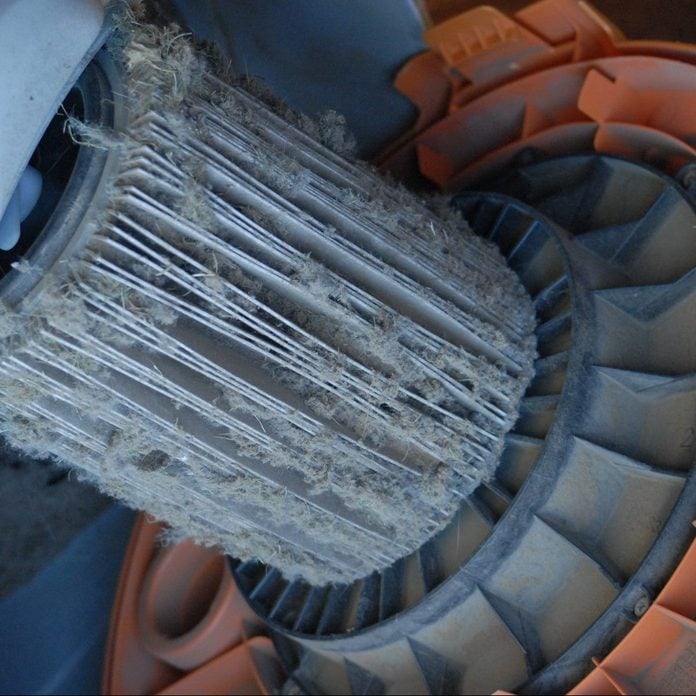Taking time to tidy your vacuum prolongs reliable, efficient operation.
8 Tips for Cleaning and Maintaining Your Shop Vac

A Mighty Vortex
When it comes to managing dust and debris around a job site, many contractors find themselves reaching for a shop vac. Tough, versatile and inexpensive, they come in many styles to suit a variety of cleanup tasks.
Their greatest strength lies in simplicity: Flip it on, point the collector at a mess, then dump out the bucket. That said, it is easy to take your shop vac for granted, and no piece of equipment attracts much attention until you need it—and it doesn’t work.
Despite the straightforward nature of their design, keeping a few simple maintenance ideas in mind can significantly prolong the life of your vacuum and save you time, money and frustration.

Change the Filter
Yes, this tip seems obvious, but honestly: When was the last time you actually changed the filter in your shop vac?
Over time, paper filters become clogged, tear or otherwise wear out. Check the label of your particular filter choice to determine its expected lifetime, and shorten that span if your shop vac gets heavy use or is frequently used to control fine particles.

Get Slap Happy
While in use, particles accumulate on the filter surface. On filters that increase surface area by incorporating a series of folds, material can build up and clog those nooks and crannies. This build-up not only forces your shop vac to work harder but it limits suction and reduces the lifespan of the motor.
Simply slapping the handle of the unit after turning it off can dislodge some of the debris before it has the chance to compact, causing it to settle in the bucket and potentially preserve the cleaning power of the vacuum.

If You Can’t Change It, Clean the Filter Regularly
When emptying the bucket, take the whole unit outside. Dump the debris and tap the bucket or wipe it out to remove any dust clinging to the sides.
Longtime Twin Cities, Minnesota-based carpenter Clint Buckner suggests knocking the filter against the side of the trash can or dumpster to dislodge any buildup from the folds and then shaking it to help it fall away from the filter.
Keep in mind that both of these actions will cause a dust cloud, so stand upwind of the can, or, when appropriate, use a protective mask.

A More Thorough Clean
To remove more of the debris, blow off the filter with low-pressure compressed air. Remember, the filter can tear if the pressure is too high, so take it easy.
Some dry filters can be cleaned with water, and the same pressure warning holds true for water streams while cleaning. The filter must have time to dry thoroughly before reinstallation or dry debris will quickly clog the filter—or worse, the paper may mold and become unusable.

Vacuum the Vacuum
In a busy workshop or on a job site, there is no avoiding dust. It settles everywhere, and that includes your shop vac. A quick clean of your vacuum’s exterior accomplishes several things.
First and most importantly, cleaning dust out of the air intake keeps the air flowing and allows the unit to deliver the most suction. As mentioned earlier, anything that forces the motor to work harder shortens its life. Frankly, vacuuming the intakes is just too simple a precaution to ignore.
Second, removing grit from castors (and periodically adding a drop of oil) keeps your vacuum rolling freely.
And last, removing the sheath of dust coating the exterior keeps it from leaving a trail behind you—a must when remodeling a home with people living in it, Buckner says.

Don’t Forget the Hose
A blockage or constriction in your vacuum hose can significantly impact the performance of a shop vac. If your vacuum suddenly loses suction, Buckner suggests you check for kinks or wear in the hose, or feel for something lodged inside it that can be shaken out.

Watch for Thinning Bristles
Buckner finds himself reaching primarily for the hose ends with brushes, particularly while doing finish work. The bristles that protect whatever surface he is cleaning tend to wear and thin, however, making them more likely to damage the surface they’re cleaning. Replacing the brush accessory is a simple fix, which Buckner has done several times during the life of his shop vac.

Make Shop Vac Maintenance a Routine
Although burning out your shop vac doesn’t directly cause downtime, it’s inconvenient, affects general safety on the site, and can impact customer satisfaction. Engraining a few simple maintenance steps for your shop vac into your daily routine will keep it humming reliably.
About the Author and Expert:
Clint Buckner is a carpenter with John Kraemer and Sons Inc. based in Edina, Minnesota, where he has worked for more than 6 years. He has 20 years experience in the trades, beginning as a finish and trim carpentry subcontractor and now performing more general carpentry.
Craig Gustafson is a writer and editor based on the East Side of St. Paul, Minnesota. He spent several formative years working on a construction crew and enjoys home-improvement projects of many types. His family has recently purchased a small property in Northern Wisconsin with a shell standing on it, which they look forward to finishing themselves.




















